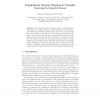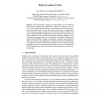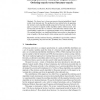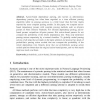129
click to vote
ECML
2007
Springer
15 years 8 months ago
2007
Springer
Many real-world classification applications fall into the class of positive and unlabeled (PU) learning problems. In many such applications, not only could the negative training ex...
105
click to vote
ECML
2007
Springer
15 years 8 months ago
2007
Springer
A general game player is an agent capable of taking as input a description of a game’s rules in a formal language and proceeding to play without any subsequent human input. To do...
125
click to vote
ECML
2007
Springer
15 years 8 months ago
2007
Springer
Conventional classification learning allows a classifier to make a one shot decision in order to identify the correct label. However, in many practical applications, the problem ...
109
click to vote
ECML
2007
Springer
15 years 8 months ago
2007
Springer
In this paper we study the identification of sparse interaction networks as a machine learning problem. Sparsity means that we are provided with a small data set and a high number...
119
click to vote
ECML
2007
Springer
15 years 8 months ago
2007
Springer
Abstract. Explanation based learning produces generalized explanations from examples. These explanations are typically built in a deductive manner and they aim to capture the essen...
113
Voted
ECML
2007
Springer
15 years 8 months ago
2007
Springer
We present Policy Gradient Actor-Critic (PGAC), a new model-free Reinforcement Learning (RL) method for creating limited-memory stochastic policies for Partially Observable Markov ...
112
click to vote
ECML
2007
Springer
15 years 8 months ago
2007
Springer
We discuss how to learn non-recursive directed probabilistic logical models from relational data. This problem has been tackled before by upgrading the structure-search algorithm i...
119
click to vote
ECML
2007
Springer
15 years 8 months ago
2007
Springer
Action-based dependency parsing, also known as deterministic dependency parsing, has often been regarded as a time efficient parsing algorithm while its parsing accuracy is a littl...
ECML
2007
Springer
15 years 8 months ago
2007
Springer
In this paper, we propose a new and general preprocessor algorithm, called CSRoulette, which converts any cost-insensitive classification algorithms into cost-sensitive ones. CSRou...
104
click to vote
ECML
2007
Springer
15 years 8 months ago
2007
Springer
Co-training is a semi-supervised learning paradigm which trains two learners respectively from two different views and lets the learners label some unlabeled examples for each oth...




